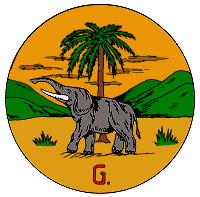National Arms of Gambia: Difference between revisions
Knorrepoes (talk | contribs) m (Text replace - "'''Origin/meaning :'''<br/>" to "====Origin/meaning====") |
Knorrepoes (talk | contribs) m (Text replace - "[[Literature" to "{{media}} [[Literature") |
||
| Line 19: | Line 19: | ||
[[File:gambia2.jpg|center]] | [[File:gambia2.jpg|center]] | ||
{{media}} | |||
[[Literature]] : - | [[Literature]] : - | ||
Revision as of 02:02, 9 July 2014
| Heraldry of the World Civic heraldry of Gambia |
NATIONAL ARMS OF THE GAMBIA
Origin/meaning
The arms were adopted on November 18, 1964.
The agricultural implements depicted in the shield are an axe and hoe and indicate that future prosperity of Gambia depends upon agriculture. The lions as supporters represent stateliness and dignity and may also recall the former colonial power. Another interpretation of axe and hoe is that these are said to represent the Mandinka and Fulani, the two more important ethnic groups of Gambia.
The crest above the helmet is a local oil palm.
Previously the British colony used only a badge showing an elephant before a palm tree, identical to Sierra Leone and Ghana, but with the letter G for the Gambia.
Contact and Support
Partners:
Your logo here ?
Contact us
© since 1995, Heraldry of the World, Ralf Hartemink 
Index of the site
Literature : -











